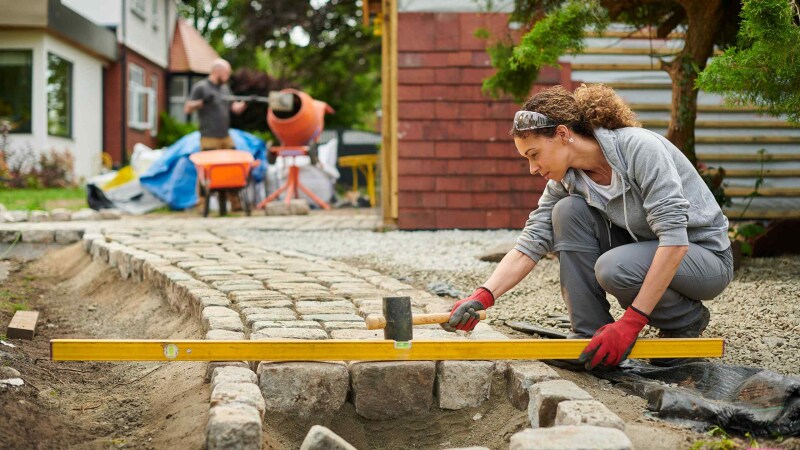Backyard pool 101: Costs, financing and budget ideas

This article is for educational purposes only. JPMorgan Chase Bank N.A. may not offer these products. Any information described in this article may vary by lender.
For some, owning a pool is one part of building the ultimate backyard. The ability to stroll out of your home and into your own personal body of water is a dream for many. Pools provide homeowners with a convenient way to exercise, play, entertain, cool off in hot weather and just generally relax. Owning a pool might even make you a little more popular when it’s hot and sunny!
While all these perks of pool ownership may be exciting, there are some considerations to keep in mind if you’re thinking about building or installing a backyard pool of your own. Understanding the unique qualities of different types of pools, their advantages and disadvantages as well as their cost could all help you make an informed decision about this kind of home improvement.
Types of backyard pools
Building or buying a pool may be a considerable commitment for some homeowners. That’s why it may be a good idea to familiarize yourself with the types of pools out there before diving headfirst into the world of pool ownership. From affordable above-ground pools to luxurious infinity pools, let’s take a look at some of the options available to lap swimmers, float loungers and quick dippers alike.
Above-ground pools
As the name says, these pools live above the ground. Above-ground pools are generally considered the most affordable pool options with generally easier installation. Instead of requiring excavation, which may be pricey, above-ground pools are constructed with a frame and a vinyl or PVC liner that holds the pool’s water. Above-ground pools are smaller than many in-ground options, making them a potentially attractive option for city dwellers and others with small backyards.
In-ground pools
In-ground pools are the classic backyard pools of teen movie fame. While they make for a good pool party locale, in-ground pools may also be costly and take a long time to construct since they require excavation. In-ground pools are generally made with concrete and are versatile in terms of shape, size and features. They’re often customizable and may even have features like waterfalls or unique landscaping.
Lap pools
While lap pools are generally in-ground pools, their purpose is primarily to provide a space that allows for swimming as exercise, so they’re generally more narrow than other in-ground pools. They’re more of a functional option and may not be ideal for a family looking for recreation or relaxation.
Infinity pools
Infinity pools are another type of in-ground pool, generally built into a property with a view. Infinity pools offer the illusion of water extending into the horizon. These visually attractive pools are most often found in luxury hotels, but their tranquil elegance may also be well-suited to a home on a hilltop or waterfront.
Swim jets
Like lap pools, a swim jet system pool is meant to provide its owner with a space for exercise but requires a bit less space. Swim jets are essentially the treadmills of swimming. They feature strong jets meant to provide resistance, which allow a person to swim in place against the current. These jets make it possible for swimmers to enjoy physical activity without the space requirements of a lap pool, potentially making them attractive for homeowners with limited space.
Spools
A spool, short for “small pool” or “spa pool” is an in-ground pool that offers the features of a traditional pool while taking up less space. These pools sometimes feature the hydrotherapy features of a spa or hot tub but may simply be a petite version of your classic in-ground pool. Like swim jets or lap pools, these pools help homeowners enjoy the perks of a pool on a smaller scale.
Stock tank pools
Stock tank pools are perhaps the smallest type of pool. They repurpose galvanized steel tanks used to hold water for livestock. These tanks vary in size, so a stock tank pool generally has enough space to hold 2 – 6 occupants. Because of their small size and limited need for materials, stock tank pools are an option for homeowners with limited space who are looking for a pool on a budget.
Should you buy a backyard pool?
Buying or building a backyard pool can potentially be a significant investment of both time and money. Because of this, it’s generally best to do your due diligence and weigh the pros of pool ownership against any possible cons. Let’s look at some of the aspects of pool ownership you may want to consider before breaking ground or making a purchase.
Pros of backyard pools
- Recreation: Backyard pools, depending on the size, may provide homeowners with a convenient space for fun and entertainment.
- Exercise: Swimming is a full-body workout, and a backyard pool could provide homeowners with a quick way to burn some calories on their own property.
- May add value to home: Depending on the pool type, location and condition, backyard pools may add value to a home. If added value is a priority for homeowners, it may help to consider these factors (especially maintenance) when planning for or purchasing a pool.
- Aesthetics: Some pools add a feeling of tranquility or luxury to a property, especially when they include features such as waterfalls, landscaping or intricate tiling.
- Relief in hot weather: There’s no denying that pools can provide fun and games, but they’re also a quick way to beat the heat in hot weather.
- Stress relief: While exercise and pool games are a priority for many pool owners, simply lounging in or outside a pool may itself be a meditative escape for homeowners seeking to escape the grind.
Cons of backyard pools
- Cost of construction: Depending on the pool, construction may cost anywhere from $1,000 to $100,000. It helps to ensure you have a solid handle of your budget before deciding on this type of purchase or endeavor.
- Higher insurance: Pool ownership may increase your liability exposure. This may require you to bolster your liability insurance coverage to protect against any potential accidents that may occur on your property.
- Maintenance: While some pools like stock tank or above-ground pools don’t require much in the way of maintenance, others require more treatment and upkeep, which may add up. Be sure to factor these costs in to make sure your budget can handle them.
- Potential danger: Homeowners concerned with child or pet safety may want to take extra precautions to avoid the danger of a pool on their property. While water comes with risks, safety features such as pool covers or gates may mitigate the potential danger.
- May not add value: While pools have the potential to add value to a property, those benefits depend on maintenance, pool type, condition and whether or not buyers want a pool. As fun as pools may be, the reality is that they’re not for everyone, so keep that in mind if you’re banking on added value.
The cost of backyard pools
The cost of backyard pools depends on the type. Above-ground pools are generally the most cost-effective, with some options costing anywhere between $1,000 – $10,000. For in-ground pools, the cost is generally higher, and depends on the scope of the project and the materials used. For most pools, you’ll also want to factor in the cost of maintenance, filtration, permits and inspection. These costs depend on your location, so it’s best to contact local businesses and government offices to get a better, more precise idea of what a backyard pool may cost you.
Financing a pool
A backyard pool can potentially be a significant investment, so some homeowners may be curious about pool financing options. While using savings helps homeowners avoid interest payments and debt, financing a swimming pool could be an option for anyone looking to enjoy the benefits with less of a wait time. Here are some of the more common methods of financing a pool:
- Pool financing loans: Some banks and institutions may offer loans designed specifically to cover pool installation costs.
- Credit cards: Depending on the pool and your line of credit, using a credit card to pay for the pool may be an option. Be sure to factor in the card’s interest rate before making this type of purchase, especially if you’re looking to pay for an in-ground pool.
- Pool builder financing: Because backyard pools are sometimes costly, some pool builders may offer their own financing options. Contacting your local pool builders to find out if this is something they offer may help you determine if their terms are right for you.
- Cash out refinancing: Depending on the amount of equity you have in your home, cash-out refinancing may provide you with enough funds to build your pool. This will mean a new mortgage for more than you actually owe on your house, so be sure you’re prepared for this adjustment before signing any papers.
- Help from friends and family: While it's not always recommended to mix family and finances, you may be able to secure a loan from loved ones, especially if they plan on enjoying your pool in their downtime. If you go this financing route, it’s generally a good idea to have clear repayment terms to avoid any potential conflicts.
In summary
Backyard pools may be a source of fun, physical activity and relaxation, but purchasing or installing them is a decision to weigh carefully. Before dipping your toes into the pool water, make sure you’re aware of both short- and long-term costs associated with pool ownership, as well as your financing options, so you can enjoy the perks without any pricey surprises down the line.



